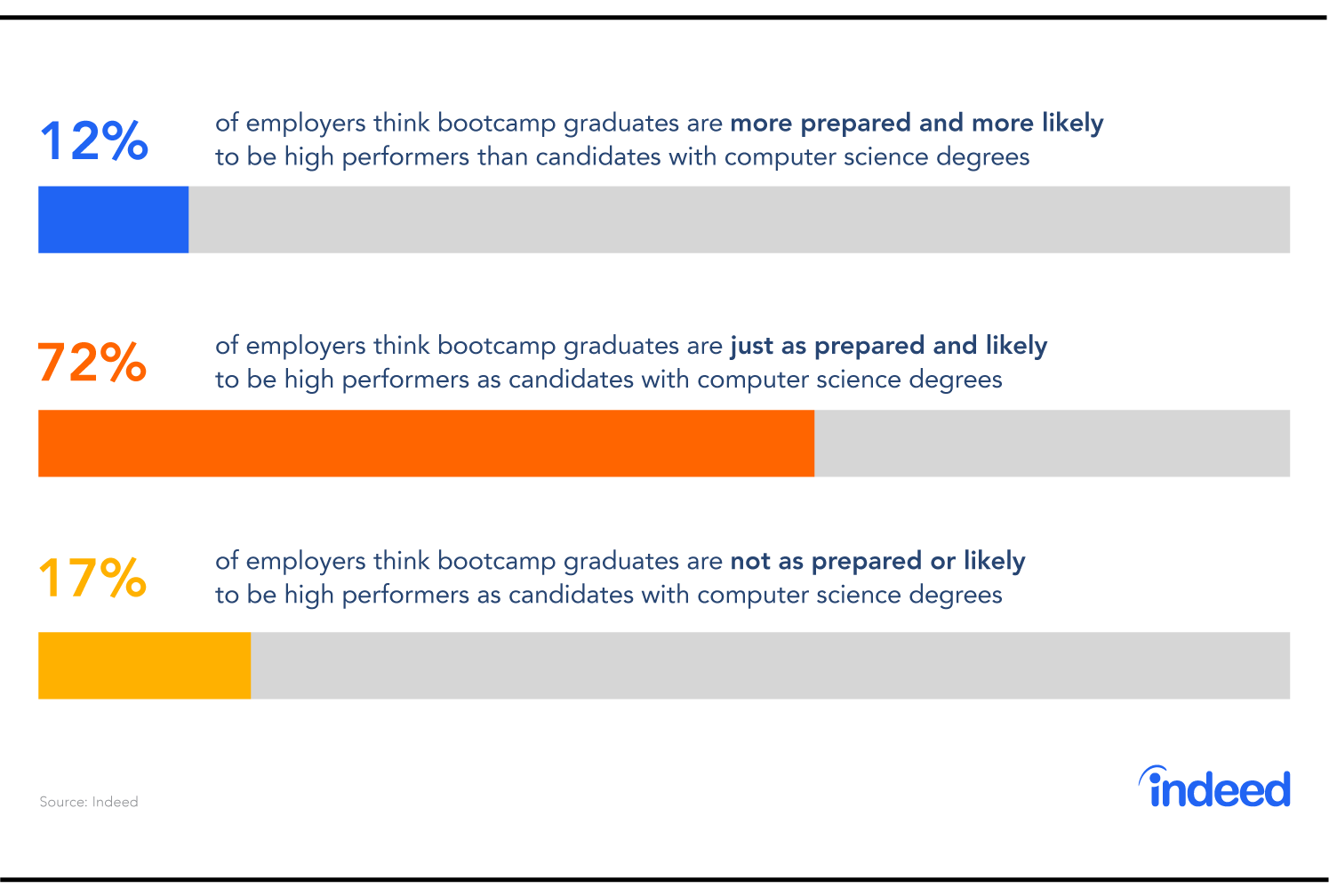Want to get a job as a developer but can’t decide between a coding bootcamp or a computer science degree. Here is some data to help you choose.
Reading time: 8 minutes
In recent years, many new options have become available to develop job-specific skills through alternative forms of education. One such alternative to traditional higher education is a coding bootcamp, perfect for job seekers eager to break into the software engineering or web development fields with limited time and a limited budget.
The skills acquired in a coding bootcamp directly prepare students for a wide variety of high pay, high growth positions across many industries. Those with solid coding experience can be digital marketers, web developers, mobile app developers, user interface (UI) or user experience (UX) designers, and software engineers. Exceptional coders can reach for the most competitive and high-reward roles like full stack developer, software architect, development operations (DevOps) engineer, or back-end developers
Meanwhile, how do bootcamps compare with computer science degrees from colleges or universities? Will companies hire you without a degree? Can you get coding jobs right after finishing a coding bootcamp? And what programs are out there that have good job placement rates?
How to compare coding bootcamps to college degrees
The cost alone of attending coding bootcamps is comparatively low versus that of an associate’s or bachelor’s degree. Meanwhile, coding bootcamps are favored by job seekers who are currently working or whose obligations are at odds with the time commitment of a traditional university or college program. And, the overall job outcomes are positive for bootcamp graduates, especially considering the skills obtained over such a short period of time.
What are the facts when comparing coding bootcamps to college degrees?
- Bootcamps have lower barriers to entry and typically no application fee
- Bootcamps have a more simple, less selective admissions process
- Bootcamps typically cost less than just 1 full-time semester at most private colleges and universities
- Bootcamps are largely offered online and usually allow significant flexibility compared to on- and off-campus degree programs
- Bootcamps often offer alternativeative financing options that are unavailable for 2- and 4-year programs
But, does a degree make a difference for getting a coding job?
Sure, some companies require their engineers to have a minimum of a bachelor’s degree in computer science or even electrical engineering for hardware and embedded systems development. However, for software, web, and application development jobs, hiring managers indicate that practical skills are increasingly more important. In a study on Indeed’s /IDEA site, 84% of respondents thought bootcamp graduates were as prepared as – if not more prepared than – candidates with computer science degrees.
In short: unless you are seeking out senior software development and engineering jobs where a degree in computer science is a requirement, coding bootcamps are cost-effective, designed to fit your schedule, and provide the essentials of coding to prepare for and land software, web, and application development jobs.
What are some coding bootcamp programs as an alternative to a degree?
Some coding bootcamps are offered by standalone schools that specialize only in teaching software engineering and web development while other coding bootcamps are non-degree certificate programs that are offered through accredited colleges and universities. Here are examples of each type – both of which have strong job placement rates and track records:
Code Fellows
- What is Code Fellows? Code Fellows offers online and in-person, accelerated tech skill programs – specifically coding bootcamp and cybersecurity certification. The coding bootcamp offers both depth and breadth in terms of full-stack software development with a curriculum that goes beyond HTML, CSS, and JavaScript syntax including advanced frameworks and libraries plus app development and data structures.
- What kind of job outcomes does Code Fellows have? A powerhouse of job preparation, Code Fellows has a 93% job placement rate for “in-field†full-time roles, i.e. software and web coding, with graduates earning an average starting salary of $72,500. Additionally, Code Fellows was recently named by Switch Up as the top coding bootcamp by number of graduate placements at the top five (5) tech giants (Microsoft, Amazon, Facebook, Apple, Google).
Stack Education
- What is Stack Education? Stack partners with universities to offer low cost certificate programs in coding and full stack web development, data analytics and clinical trial management. Among the schools where Stack offers its coding bootcamp are University of Vermont, St. Joseph’s University, Framingham State University, and University of Hartford.
- What kind of job outcomes does Stack have? Stack Education’s programs are intended to teach individuals without experience the skills they need to be market-ready upon completion – and they deliver. Our data shows that MentorWorks-financed Stack bootcamp graduates were employed with an average salary increase of 159% higher than their pre-school average income, with an average postgraduate salary for employed graduates at $62,000. For the $10,000 coding bootcamp cost and roughly 15% the average starting salary, this represents a solid return on investment in an educational program that prepares you for an in-demand job and access to the same opportunities as college grads.
MentorWorks Education Capital, Inc., an education and career access company, has curated a list of more coding bootcamp schools and other skills-based programs that can help you start or advance a technology-enabled career in business.


